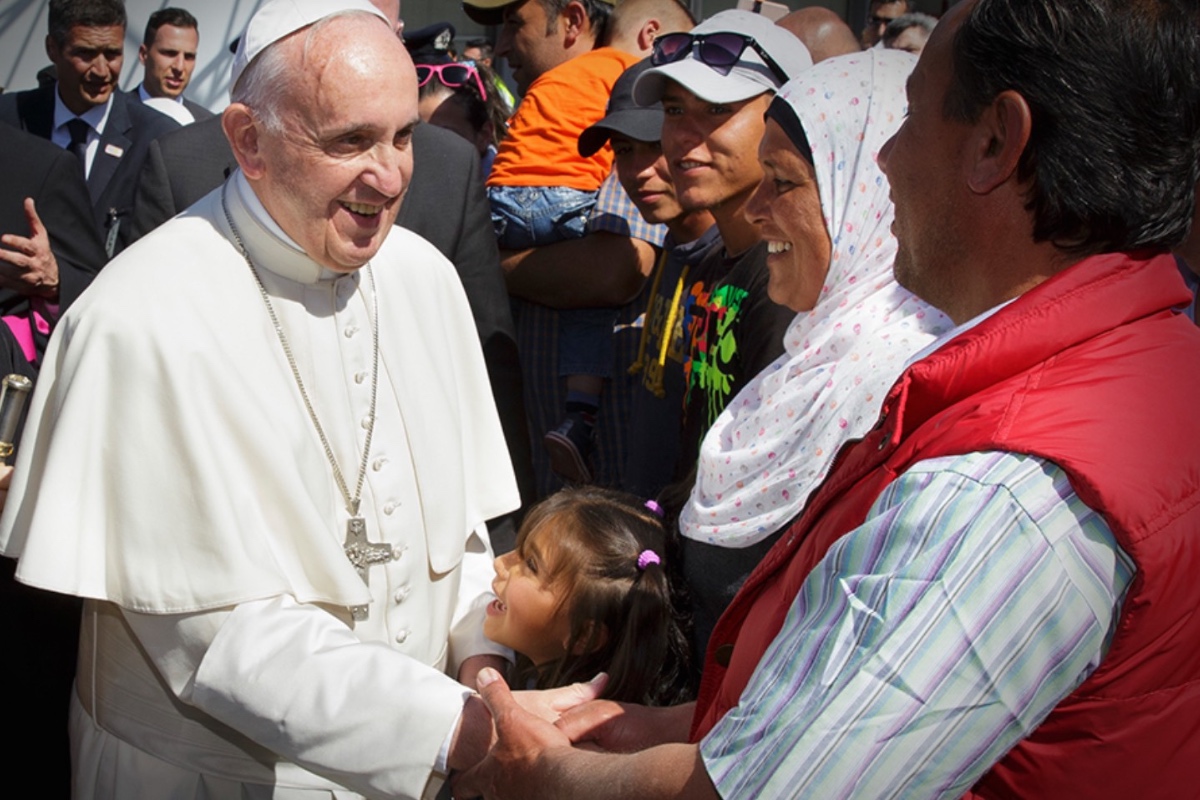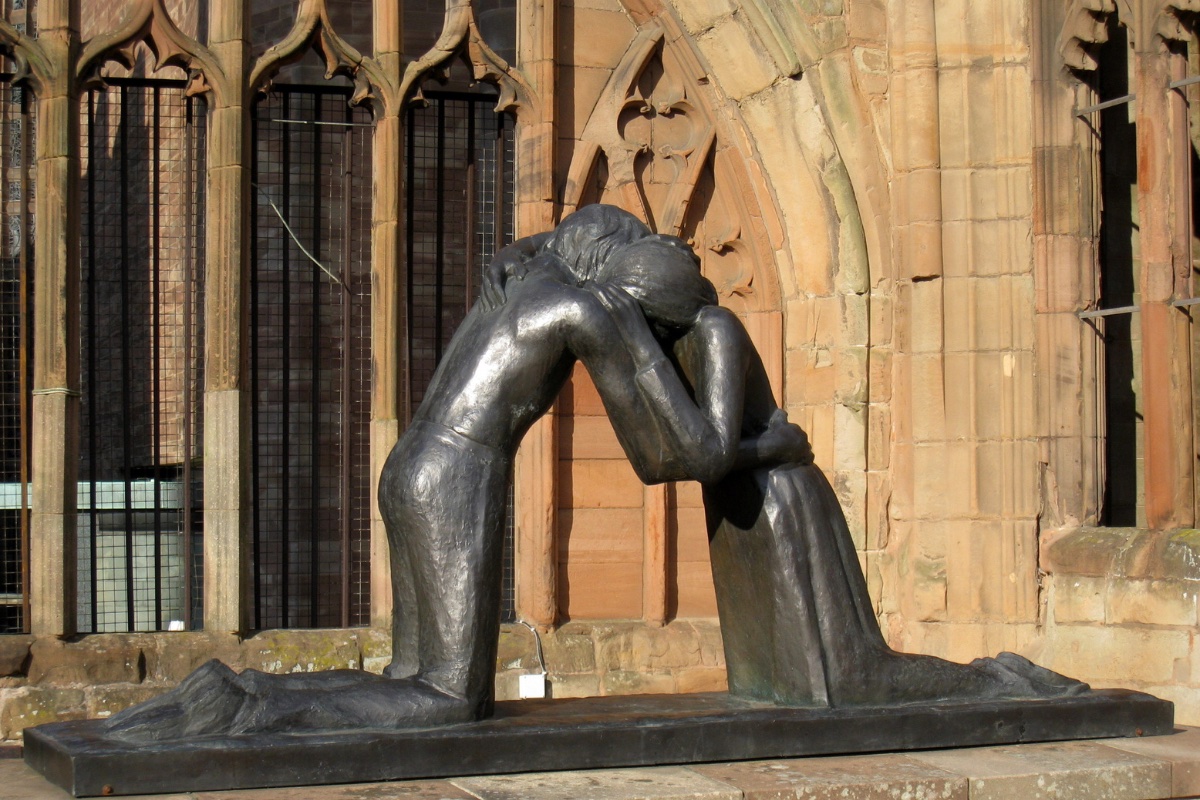The following is an excerpt from the message of His Holiness Pope Francis for the celebration of the fiftieth World Day of Peace (January 1, 2017).
On this occasion, I would like to reflect on nonviolence as a style of politics for peace. I ask God to help all of us to cultivate nonviolence in our most personal thoughts and values. May charity and nonviolence govern how we treat each other as individuals, within society and in international life. In the most local and ordinary situations and in the international order, may nonviolence become the hallmark of our decisions, our relationships and our actions, and indeed of political life in all its forms.
Violence is not the cure for our broken world. Countering violence with violence leads at best to forced migrations and enormous suffering, because vast amounts of resources are diverted to military ends and away from the everyday needs of young people, families experiencing hardship, the elderly, the infirm and the great majority of people in our world. At worst, it can lead to the death, physical and spiritual, of many people, if not of all.
THE GOOD NEWS
Jesus lived in violent times. Yet he taught that the true battlefield, where violence and peace meet, is the human heart: for “it is from within, from the human heart, that evil intentions come” (Mk 7:21). But Christ’s message in this regard offers a radically positive approach. He unfailingly preached God’s unconditional love, which welcomes and forgives. He taught his disciples to love their enemies (cf. Mt 5:44) and to turn the other cheek (cf. Mt 5:39). When he stopped her accusers from stoning the woman caught in adultery (cf. Jn 8:1-11), and when, on the night before he died, he told Peter to put away his sword (cf. Mt 26:52), Jesus marked out the path of nonviolence. He walked that path to the very end, to the cross, whereby he became our peace and put an end to hostility (cf. Eph 2:14-16). Whoever accepts the Good News of Jesus is able to be healed by God’s mercy, becoming in turn an instrument of reconciliation.
To be followers of Jesus today also includes embracing his teaching about nonviolence. As my predecessor Benedict XVI observed, that teaching “is realistic because it takes into account that in the world there is too much violence, too much injustice, and therefore that this situation cannot be overcome except by countering it with more love, with more goodness. This ‘more’ comes from God.”1 He went on to stress that: “Nonviolence is not merely tactical behavior, but a person’s way of being, the attitude of one who is so convinced of God’s love and power that he or she is not afraid to tackle evil with the weapons of love and truth alone. Love of one’s enemy constitutes the nucleus of the ‘Christian revolution.’”2
Blessed are the meek, Jesus tells us, the merciful and the peacemakers, those who are pure in heart, and those who hunger and thirst for justice.
MORE POWERFUL THAN VIOLENCE
Nonviolence is sometimes taken to mean surrender, lack of involvement and passivity, but this is not the case… The decisive and consistent practice of nonviolence has produced impressive results. The achievements of Mahatma Gandhi and Khan Abdul Ghaffar Khan in the liberation of India, and of Dr Martin Luther King Jr in combating racial discrimination will never be forgotten. Women in particular are often leaders of nonviolence, as for example, was Leymah Gbowee and the thousands of Liberian women, who organized pray-ins and nonviolent protest that resulted in high-level peace talks to end the second civil war in Liberia.
If violence has its source in the human heart, then it is fundamental that nonviolence be practiced before all else within families. The family is the indispensable crucible in which spouses, parents and children, brothers and sisters, learn to communicate and to show generous concern for one another, and in which frictions and even conflicts have to be resolved not by force but by dialogue, respect, concern for the good of the other, mercy and forgiveness.3 From within families, the joy of love spills out into the world and radiates to the whole of society.4 The politics of nonviolence have to begin in the home and then spread to the entire human family.
MY INVITATION
Peacebuilding through active nonviolence is the natural and necessary complement to the Church’s continuing efforts to limit the use of force. Jesus himself offers a “manual” for this strategy of peacemaking in the Sermon on the Mount. The eight Beatitudes (cf. Mt 5:3-10) provide a portrait of the person we could describe as blessed, good and authentic. Blessed are the meek, Jesus tells us, the merciful and the peacemakers, those who are pure in heart, and those who hunger and thirst for justice.
This is also a program and a challenge for political and religious leaders, the heads of international institutions, and business and media executives: to apply the Beatitudes in the exercise of their respective responsibilities. It is a challenge to build up society, communities and businesses by acting as peacemakers. It is to show mercy by refusing to discard people, harm the environment, or seek to win at any cost. To act in this way means to choose solidarity as a way of making history and building friendship in society. Active nonviolence is a way of showing that unity is truly more powerful and more fruitful than conflict.
I pledge the assistance of the Church in every effort to build peace through active and creative nonviolence. The Church will promote in an ever more effective way “the inestimable goods of justice, peace, and the care of creation” and concern for “migrants, those in need, the sick, the excluded and marginalized, the imprisoned and the unemployed, as well as victims of armed conflict, natural disasters, and all forms of slavery and torture.”5
“All of us want peace. Many people build it day by day through small gestures and acts; many of them are suffering, yet patiently persevere in their efforts to be peacemakers.”6 May we dedicate ourselves prayerfully and actively to banishing violence from our hearts, words and deeds, and to becoming nonviolent people and to building nonviolent communities that care for our common home.
In loving memory of His Holiness Pope Francis (1936-2025).
Access the full version for this article here at the Vatican's website.
Photo credit: flickr/JeffyBruno
Sources:
- BENEDICT XVI, Angelus, 18 February 2007.
- Ibid.
- Post-Synodal Apostolic Exhortation Amoris Laetitia, 90-130.
- ibid., 133, 194, 234.
- Apostolic Letter issued Motu Proprio instituting the Dicastery for Promoting Integral Human Development, 17 August 2016.
- Regina Coeli, Bethlehem, 25 May 2014.





